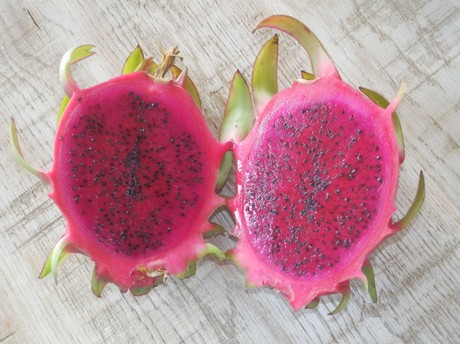Harvesting of pitaya will start next week in Israel, and though it's too soon to accurately determine this year's output, growers are anticipating a season with adequate volumes. The Israeli fruit is exported to the UK and continental Europe by air, ensuring that the product retains the distinctive aroma and taste that it's come to be known for.

“Our pitaya is sweeter, so it doesn't have as long a shelf life as dragon fruit from Asia, so we have to send it by air,” said Avniv's Niva Ben Zion. “While Asian fruit is cheaper and has a longer shelf life, it doesn't have the Israeli fruit's red color, distinctive flavor and sweet taste.” As a result, Israeli pitaya is handled as a specialty fruit and sold mostly in specialty shops in Europe, though it does have higher penetration in supermarkets in the UK Because of its niche status, Niva believes educating consumers about the fruit is important, and Israeli exporters have made efforts to teach consumers about the fruit and how to use it.
“Some consumers may be familiar with a product that's similar to our pitaya but that's really a lesser product,” said Niva, referring to dragon fruit from Asia. “So we need to gain the trust of people by having them try our pitaya and seeing that it's much different than what they might have tried before.” Niva is hopeful that more people will try Israeli pitaya, and she points to mangos and avocados as products with which European consumers were not familiar but are now mainstays in supermarkets throughout the continent. For now, though, Niva thinks they have a good niche market for their fruit.

“Harvesting pitaya requires lots of manual labor, so it's an expensive item that not many people grow,” said Niva. “The ones who do grow it specialize in pitaya, and they're anticipating nice yields, so it will likely be a normal season.” She's wary of the fruit taking off too soon, as more product on the market would bring down prices and could lead to a situation where growers have to grow more to earn the same as before. For now, the situation is steady for Israeli growers and exporters of pitaya.
Avniv also exports passion fruit, and with half the season gone, Niva said they export much more passion fruit than pitaya. While pitaya is a niche product that is only sold on the fresh market, passion fruit growers can sell their product fresh or send it to the processing market. The additional sales avenue makes passion fruit a more stable commodity, and the added security attracts more growers, which, in turn, leads to more volume.
“We also send our fresh passion fruit by air to Europe,” said Niva. “By doing that, instead of sending it by sea, we guarantee it doesn't lose its taste or aroma.”





